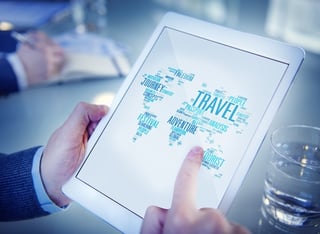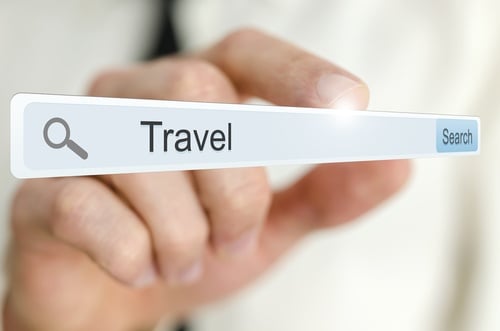How Cognitive Computing Could Change How We Travel
By Nick Ostdick on Apr 21, 2016 12:26:00 PM
 It sounds like something straight out of The Jetsons: Describing your criteria for an upcoming business trip or vacation to a computer, which then instantaneously generates personalized recommendations based on profiles culled from past purchasing behavior.
It sounds like something straight out of The Jetsons: Describing your criteria for an upcoming business trip or vacation to a computer, which then instantaneously generates personalized recommendations based on profiles culled from past purchasing behavior.
Perhaps even more out of this world? The computer could then actually book your entire destination package making choices about airlines, flight times, hotel accommodations, and other bookings based on a profile of your most recent travel preferences.
Science fiction, right? Not necessarily thanks to one of the next big waves of technological innovation to hit the travel industry: cognitive computing.
Broadly speaking, cognitive computing, initially popularized by IBM’s Watson - which is perhaps best known for its success as a “contestant” on the quiz show Jeopardy - is a self-learning system that utilizes data mining, pattern recognition, voice recognition, and natural language processing to replicate the ways a human brain works. Somewhat elementary applications of CC are already in production en masse today - for example, pull out your iPhone and ask Siri about the current weather conditions in your neighborhood.
The travel industry has been more or less proactive in adopting some of the most interesting computing advancements in recent years - Big Data, The Internet of Things, and others. And while these innovations have allowed the travel industry to gather, analyze, and act on data in quicker and more detailed ways, CC has the potential to be the next big technological revolution in providing travelers with more power and flexibility than ever before.
Cognitive vs. Cloud Computing
The lines between cognitive and cloud computing can blur, especially for those who may not have encountered cognitive computing before. They both sound similar and both cognitive and cloud computing function on similar base levels, but its in the details where these two computing platforms - cloud being more of the industry standard where cognitive is seen as the future - truly diverge.
Cloud computing, as most travel industry insiders know, is great at culling large quantities of data and information from multiple source points. This data can then be analyzed in real-time, dispersed to key players across a company’s value chain, and acted upon in the execution of informed, growth-oriented decisions. In addition, because cloud computing relies on a network of connected devices, and because data from these connected devices is housed in one centralized interface, it allows for the destruction of functional silos across a company’s entire platform and fosters greater communication and collaboration amongst those within the company, partners, vendors, and other important players.
The travel industry can essentially view cloud computing as a very efficient mop, soaking up as much data as possible which can then be wrung out for companies to review. This sophisticated mop has helped travel companies reengineer their ERP software and solutions, demand planning, and overall marketing strategies to create more effective and cost-efficient methods of interacting between suppliers and customers.
But where cognitive computing really breaks away from its cousin cloud computing is when it comes to applying all this data and using it to actually learn and provide insight into customer behavior. As many saw with Watson’s appearance on Jeopardy, cognitive computing combines unstructured data points or sources into more fully-realized data sets to paint an interactive portrait of a customer or consumer base. Essentially, the ability of a cognitive system to actually learn about a market pool based on large data sets takes the gathering power of cloud computing and gives the travel industry more actionable consumer profiles on which to base new or existing products and services.
If cloud computing was an extremely absorbent mop, cognitive computing is a mop that tells you exactly which part of the floor needs the most cleaning, how to best clean it, and when or how it might need to be cleaned in the future.
Impact of Cognitive Computing
According to CNBC, the online travel industry generated more than $35 billion in the first quarter of 2015 alone, an increase of roughly 11 percent from the same time the year prior; more than 180 million people simply visited travel sites during the same period last year, which was up 27 percent from 2014. Simply put, the online travel industry is booming, and the impact of cognitive computing could only further the boom by facilitating greater flexibility and agility from research, booking, disruption management, and nearly every other touch point across the value chain.
Here are just three ways cognitive computing could change the way we travel:
Searchability of Travel Options: Industry surveys indicate travelers spend days using between 10-15 websites or mobile apps researching destination options before booking, resulting in oceans of information travelers have to swim through in order to find what they’re looking for. Cognitive computing has the ability, based on profiles or criteria from past travel purchases, web history, and so forth to serve as an aggregator in compiling the most relevant options based on the customer’s behavior and desires. Instead of simply entering destinations into a search bar via an OTA website, cognitive computing has the capability to simplify travel options - flight, hotel, leisure activities, etc - and refine these based on location, budget, and other important deciding factors.
Disruption Management: Imagine you’re flight is delayed indefinitely due to weather concerns. You’re stranded at the airport and have to reconfigure your entire game plan for the rest of your trip - hotel bookings, pre-planned activities, return flights, etc. What would once mean a series of online interactions to create or cancel bookings now means simple inputs to rearrange reservations based on the disruption. Cognitive computing can give the traveler the capability to simultaneously cancel bookings at their previous destination while securing new bookings at their current location with personalized recommendations for hotel, flight, and even dining options. Gone are the days when a flight delay meant a logistical nightmare to rebook new flights and find hotel space in an unfamiliar place - cognitive computing has the capacity to create a domino-effect of ease and affordability in managing travel disruptions.
Travel Recommendations: You and a few friends are planning a trip to New York City for the weekend. You log on to the NYC tourism website to research airports, hotels, and activities and discover the website has highlighted sections of bookings that are of most interest to you. Or, perhaps you enter the following into a search bar: three friends, budget-friendly, weekend, museums, outdoor activities, centrally-located, unique food and drink. Based on this criteria, a series of recommendations is generated for you complete with pricing options, availability, and one-click booking. This is where cognitive computing is headed and perhaps the most profound impact it may have on the travel industry - the ability to tailor travel recommendations based on previous travel habits or detailed inputs. Essentially, cognitive computing has the potential to combine the convenience and speed of OTAs with the personal touch of a travel agent.
When Will Cognitive Computing Arrive?
It’s difficult to say when and how cognitive computing will proliferate throughout the travel industry, though many tourism industry analysts believe it’s only a matter of time before this technology becomes more widely available rather than exclusive to the few companies implementing it today. But whenever it arrives, it’s safe to say the power and ease of cognitive computing will result in more intuitive, interactive processes for travel and tourism, and will likely help increase an already burgeoning industry.
Read the eBook "Why should you invest in travel technology?" and explore how you can embrace technology if you want to grow.
- travel technology (60)
- Travel Industry (49)
- travel agency (31)
- travel erp (31)
- travel trends (28)
- travel booking system (23)
- TINA (21)
- travel company (19)
- Tour Operator (18)
- Product updates (17)
- Travel Management Company (17)
- AIDA (15)
- TBS (15)
- Business Travel (14)
- dcs plus news (14)
- tour operator solution (14)
- travel website (14)
- travel erp system (13)
- Mobile App (12)
- Travel App (12)
- mid back office solution (12)
- trends (12)
- Corporate Travel (11)
- Industry Events (11)
- Mobile Technology (11)
- TMC (11)
- travel agents (11)
- erp (10)
- erp system (10)
- Tour Operators (9)
- Travel booking engines (9)
- dcs plus (9)
- online travel agency (9)
- travel agent (9)
- Mobile Bookings (8)
- travel (8)
- travel agencies (8)
- 2017 (7)
- Business Traveler (7)
- Mobile Travel (7)
- travel business (7)
- travel software (7)
- Digital Technology (6)
- Insider (6)
- Millennials (6)
- Online booking systems (6)
- Travel Management Companies (6)
- process automation (6)
- travel companies (6)
- Big Data (5)
- Partners interviews (5)
- Tour Operator Software (5)
- customer retention (5)
- travel agency technology (5)
- Booking engines (4)
- CSBT (4)
- Mobile Device (4)
- Mobile travel apps (4)
- OTAs (4)
- Static databases (4)
- Tour Companies (4)
- Travel Policy (4)
- Travel booking systems (4)
- Travel suppliers (4)
- back office automation (4)
- corporate self booking tool (4)
- millennial travelers (4)
- online travel (4)
- responsive travel website (4)
- technology (4)
- travel website conversion (4)
- 2016 (3)
- Content mapping (3)
- Databases (3)
- Demographics (3)
- Food and Adventure Tourism (3)
- Mobile Apps (3)
- Travel Distribution Channels (3)
- Travel Management Software (3)
- Travel customers (3)
- Travel history (3)
- anniversary (3)
- automated processes (3)
- content matching (3)
- global travel industry (3)
- social media (3)
- travel agency workflow (3)
- travel back office (3)
- travel marketing (3)
- travel process automation (3)
- AI in travel (2)
- Advanced Booking Systems (2)
- B2B Travel Resellers (2)
- Bleisure (2)
- Branding (2)
- Business Process Automation (2)
- Business Travelers (2)
- Customer engagement (2)
- Financial Reporting (2)
- Food Tourism (2)
- Inbound Marketing (2)
- Infographic (2)
- Leisure Travel (2)
- Saas (2)
- Templates (2)
- Travel Costs (2)
- Travel bookings (2)
- Travel start-up (2)
- Travel website abandonment (2)
- WTM 2016 (2)
- abandoned travel bookings (2)
- engagement marketing (2)
- internet booking engine (2)
- millennial traveler (2)
- new travel company (2)
- office (2)
- online reputation management (2)
- online travel reviews (2)
- reporting (2)
- software (2)
- start-up tips (2)
- travel agency management (2)
- travel agency website (2)
- travel experience (2)
- travel mobile app (2)
- travel packages (2)
- travel reservation system (2)
- travel system (2)
- travelers (2)
- web-based travel erp (2)
- 2020 (1)
- 360 Customer View (1)
- Advanced Accommodation Contract Management (1)
- Adventure travelers (1)
- Apps (1)
- B2B Reseller (1)
- B2B Resellers (1)
- B2C (1)
- BI Reporting (1)
- Budget traveler (1)
- Cancellations (1)
- Chat (1)
- Chinese millennial (1)
- Cloud (1)
- Cognitive computing (1)
- Comparison shopping (1)
- Conference (1)
- Contact matching (1)
- Content (1)
- Cruise (1)
- Culinary traveler (1)
- Customer relations (1)
- Digital Innovation (1)
- Digital Natives (1)
- Documents (1)
- Emerging market travelers (1)
- Emerging markets (1)
- Errors (1)
- Experimental travel (1)
- Financial Dashboard (1)
- Import rates (1)
- Instant messaging (1)
- Integrate with Accounting Software (1)
- Internet (1)
- Luxury traveler (1)
- Mobile Transaction (1)
- Mobile payments (1)
- NDC distribution (1)
- Operational Reporting (1)
- Reseller networks (1)
- Resellers (1)
- Response (1)
- Subagents Network (1)
- TINA Academy (1)
- TTE (1)
- Travel Reseller Network (1)
- Travel Revenue Management (1)
- Travel booking problems (1)
- Travel finance reporting (1)
- Travel stats (1)
- WTM (1)
- abandonment (1)
- accomodations (1)
- advanced reporting (1)
- airline direct connect technology (1)
- ancillary services (1)
- cloud computing (1)
- collection (1)
- collection challenges (1)
- common data model (1)
- conversion rates (1)
- corporate mobile app (1)
- cost control (1)
- credo ventures capital invests in dcs plus (1)
- customer reviews (1)
- data analysis (1)
- dcs plus credo investment (1)
- dcs plus credo ventures (1)
- deloitte technology fast 500 EMEA (1)
- digital transformation (1)
- e-invoicing KSA (1)
- email marketing (1)
- email marketing for OTAs (1)
- erp e-invoicing (1)
- lost travel bookings (1)
- modern travel agencies (1)
- networks (1)
- new features (1)
- offers (1)
- online customer review (1)
- online reputation (1)
- online travel agencies (1)
- risk management (1)
- sales (1)
- senior travelers (1)
- shopping baskets (1)
- shopping carts (1)
- social network (1)
- standardized processes (1)
- static content (1)
- travel SaaS (1)
- travel account services (1)
- travel agency customers (1)
- travel agency profitability (1)
- travel analytics (1)
- travel blog (1)
- travel planning (1)
- travel reviews (1)
- travel shopping carts (1)
- travel software for agencies (1)
- travel software system (1)
- travel technology europe (1)
- travlist smart mobile app (1)
- trend (1)
- trusted adviser (1)
- trusted advisor (1)
- upsell functionality (1)
- vouchers (1)
- website traffic (1)
- zatca (1)
Subscribe by email
You May Also Like
These Related Stories

How Technology is Reshaping Corporate Travel

Working Smart: How Travel Agents Benefit from Advanced Booking Systems


No Comments Yet
Let us know what you think